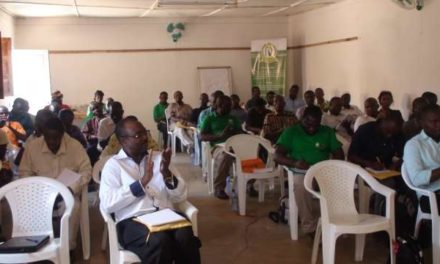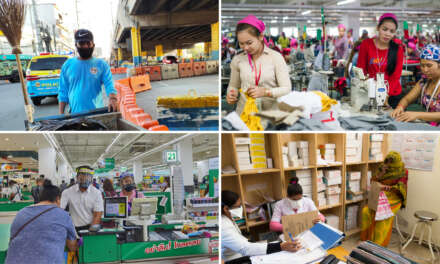13 November 2012
Introduction
This statement is the outcome of a two-day workshop, “Demanding Accountability in ASEAN: A Workshop on Rights Protection and Accountability Standards in Sovereign, Multilateral and Corporate Investment in ASEAN”, attended by more than 80 civil society organizations in Southeast Asia, which was held in Phnom Penh, Cambodia on 12-13 November 2012. This workshop was organized by Solidarity for Asian Peoples Advocacy (SAPA) under the aegis of the ASEAN Grassroots People’s Assembly (AGPA). With the overarching theme of “Making human rights and democracy in ASEAN real”, the AGPA is aimed at bringing issues and campaign for change to the attention of Cambodian and ASEAN leaders, coinciding with the ASEAN Summit that will take place in Cambodia on 18-20 November 2012.
Previously, in 2011, two public hearings on the issue corporate accountability were organized by SAPA. This latest workshop represents the continued efforts of civil society groups in the region to further advocate for the change of values, laws, policies and practices of all actors, especially the financiers and their host governments, to ensure rights protection and accountability in sovereign, multilateral and corporate investments in the region. Participants at this latest workshop also deliberated over a research report, Corporate Accountability in ASEAN: A Rights-Based Approach, which, when finalised, will be presented to the ASEAN Intergovernmental Commission on Human Rights (AICHR) as civil society’s input to the Commission’s ongoing thematic study on Corporate Social Responsibility (CSR).
Business and Serious Human Rights Violations in ASEAN
Recent years have seen an accelerated integration of ASEAN countries into the global market economy, with an export-orientated resource extractive model of economic growth that is driven by trade and investment agreements entered into by ASEAN governments to support business interests within ASEAN without regard to the already established reality of limits to growth due to climate change, the scarcity of land and other non-renewable resources. These can be seen in new industrial policies and foreign investment laws and guidelines, which have had major impacts on the lives and livelihoods of the peoples of ASEAN. Whilst GDP is rising and measures of well-being are improving for some, inequality is widening and wealth is not equitably redistributed. Large-scale projects conducted under the narrative of “development”, such as mining, dams, roads and industrial plantations, combined with poorly-planned rapid urbanization have led to environmental degradation and resulted in negative impacts on human rights, cultures and livelihoods of peoples and communities in the region. Land grabbing, involuntary resettlement, forced evictions, the loss of traditional livelihoods and access to natural resources for people who depend on them, intensification of armed conflict, and other human rights violations perpetrated by state and non-state actors are endemic in the region.
Furthermore, access to information, participation and consultation of affected groups and their support groups/partners in decision-making processes in these projects remain largely insufficient. There is also an increasing phenomenon of pursuing criminal prosecutions against human rights defenders working on issues of corporate accountability.
Despite the largely unaddressed negative impacts of businesses in the region, ASEAN governments have strongly pushed for the creation of an ASEAN Economic Community (AEC) by 2015 that would facilitate accelerated cross-border trade and investment in the region, without adequate safeguards set in place for those marginalized by the process. It is thus evident that there is a wide gap between ASEAN governments’ pro-business orientation and its commitment to ensure the human rights of its peoples. Food sovereignty, environmental protection and climate justice, sustainable development, social and economic justice must all be unequivocally pursued to ensure human rights and a life of dignity.
Weak Human Rights Protection Mechanisms at National and Regional Levels
The lack of judicial independence, high disregard for civil and political rights, and constrained media are all measures of weak governance that in turn exacerbate the risk of human rights violations by states and business that often go unpunished, unprosecuted, and under-reported. The situation is compounded by the very low rate of ratification to the international human rights instruments by ASEAN governments. In countries where there are high rates of ratification of international human rights instruments, implementation has been generally weak, with the failure to incorporate international instruments into domestic laws and policies.
There are currently five national human rights institutions (NHRIs) in ASEAN (in Indonesia, Malaysia, Thailand, the Philippines, and most recently Burma), in addition to the Provedor for Human Rights and Justice in Timor Leste. NHRIs in the region have largely not fully fulfilled their potential role in the protection of human rights. The lack of independence and effectiveness of NHRIs in the region has been a longstanding concern. The most recently established Myanmar National Human Rights Commission (MNHRC), for example, does not comply with the Paris Principles, and has not exercised its protection and complaints-handling mandate. Similar concerns of lack of compliance with the Paris Principles remain in other NHRIs in varying degrees.
At the ASEAN level, AICHR, established in October 2009, has to date refused to receive cases of human rights violations for investigation.
Meanwhile, although AICHR has undertaken a baseline thematic study on CSR and Human Rights in ASEAN, there has not been publicly available information on the details of the study, the progress of the study, as well as the composition of the research team. There has also not been any consultation with civil society.
AICHR’s drafting of the ASEAN Human Rights Declaration (AHRD) has suffered from a lack of transparency and public participation, and has not fully incorporated international human rights laws and standards. With regard to business and human rights, whilst the first draft of the AHRD included a reference to Corporate Social Responsibility (CSR), this was removed from the text in the most recent draft that was subject to regional consultation in September 2012.
International Human Rights Standards and ASEAN Governments’ Non-Compliance
While the “Protect, Respect and Remedy” framework developed by the Special Representative of the UN Secretary-General on human rights and transnational corporations and other business enterprises and the subsequent Guiding Principles are welcomed, the final text of the Guiding Principles fall short of the expectations of human rights groups on several aspects. These include its failure to adequately address the issue of extraterritorial obligations; the failure to acknowledge the increasing phenomenon of criminal prosecution against human rights defenders working on issues of corporate accountability; the insufficient emphasis on addressing the issue of participation and consultation of affected groups; and the lack of clear recognition of the right to reparation as part of the right to an effective remedy.
Notwithstanding these weaknesses, it must be reiterated that domestic laws and policies in ASEAN countries largely fall even lower than these standards.
International Financial Institutions (IFIs), such as the World Bank and Asian Development Bank (ADB), are the biggest development financiers for majority of ASEAN countries. For the World Bank in particular, there are early indications that they may seek to weaken the existing safeguards through its upcoming review and update, potentially replacing them with vague principles and non-mandatory “flexible” implementation standards. Furthermore, the economic model imposed by IFIs stresses market deregulation, trade liberalization and privatization of essential goods and services. Coupled with violations associated with development projects, the interests and human rights of ordinary peoples are readily compromised.
Increased Power of Corporations, Weaker Governments
In a world facing multiple crises of finance/economy, climate, nature and biodiversity, and food, we are experiencing governments’ increasing reliance on the market to fulfill their responsibilities in the provision of basic services to its people. Social and environmental standards, labour laws, even countries’ constitutions are being violated in the pursuit to lure in foreign investments.
While there is a growing promotion of “Corporate Social Responsibility” (CSR) in ASEAN – including the establishment of the ASEAN CSR Network by five ASEAN member states in 2010 and the ongoing thematic study on CSR by AICHR – the term CSR itself remains ambiguous and there is no clear agreement on its definition.
There are currently a plethora of existing international CSR standards, of which a vast majority of them are voluntary and ineffective, which arguably allows companies to pick and choose between more and less rigorous frameworks. In general, there are stark contradictions between corporate mission statements and CSR policies, and corporations’ actions on the ground. Furthermore, some CSR activities are nothing more than exercises in window dressing to enhance the image of corporations.
Moreover, in ASEAN, tendencies towards high levels of corruption, weak political and civil rights, and constrained media increase the risks of poor business practices in the region.
Recommendations
In view of these issues, we strongly and urgently call on,
All ASEAN governments to:
- Review existing national laws to ensure that corporate investments and activities are in compliance with international human rights laws and standards;
- Acknowledge the existing duty to protect and promote human rights and adopt a rights-based approach within the state’s jurisdiction;
- Ensure that all individuals, men and women, and local communities affected by business projects have adequate participation and representation within the business and human rights framework. This includes their ability to represent themselves through freely self-chosen representatives or organizations, their ability to organize freely as cooperatives or unions to improve their access to wages, land rights, capital and benefits. In particular, all governments must immediately implement the requirements for the Free Prior and Informed Consent (FPIC) of indigenous peoples, especially in relation to development and corporate projects affecting their territories;
- Ensure access to effective remedy and redress, including through judicial, administrative, legislative, or other means for those whose human rights have been violated;
- Adopt a clear set of regional standards that reflect international standards and a grievance mechanism (dispute resolution mechanism; audit system; advisory for corrective action) when these standards are violated;
Businesses in ASEAN to:
- Commit to a rights based approach to corporate accountability by requiring human rights due diligence both in the company’s own direct activity, and through associated operations, and by committing to relevant industry sector standards;
- Comply with existing laws and international human rights standards, and act to reinforce good governance rather than undermine it. In instances where the existing State or international law fails to adequately protect, demonstrate good practice by exceeding legal expectations and work to improve them;
- Promote an inclusive and meaningful participatory approach to business and development by informing and including local communities in development projects, extractive industries, and other areas where populations are affected. Support mechanisms to enable the public to more actively participate in decision-making processes;
- Acknowledge that developmental projects may have trans-boundary environmental and social impacts, and thus conduct impact assessments to ensure comprehensive, sustainable and participatory planning;
- Insist that impunity is unacceptable by practicing a zero-tolerance policy on abuse and proactively remedy human rights violations whilst ensuring access to independent grievance and redress mechanisms.
AICHR to:
- Include corporate accountability in the ASEAN Human Rights Declaration;
- Actively strengthen the regional mandate of AICHR to protect and promote human rights. Including by calling for state ratification of international human rights treaties. This ensures a common basis for human rights norms across ASEAN, provides a consistent set of norms for businesses investing across ASEAN, and prevents a race to the bottom by dissuading investors that seek to exploit differentiated weaknesses in legal frameworks;
- Operate with full transparency, disclosure and public consultation and regularly engage with NHRIs, civil society and all relevant stakeholders; The access to information shall be promoted and observed prior to the commencement of activities which may have negative impact on the environment and on related communities;
- Urgently receive complaints on human rights violations from individuals, groups and member states, and engage with the state concerned (and where necessary with the business) to ensure that the violation is stopped and justice and reparations are provided to victims;
- Undertake to ensure protection for human rights defenders working on issues of corporate accountability;
NHRIs to:
- Strengthen the role of NHRIs throughout ASEAN by expanding collaboration efforts between NHRIs and encouraging remaining ASEAN countries to establish NHRIs;
- Encourage and utilize support, investigation and reports from civil society. Civil society can assist NHRIs as both a watchdog and provider of background investigation on potential violations;
- Strengthen and expand the existing role of NHRI’s by fully-utilizing its mandates to investigate cases of alleged business human rights violations, including in third countries, and by ensuring meaningful participation of alleged victims of human rights abuses and local representative organizations in NHRI work;
- Undertake to ensure protection for human rights defenders working on issues of corporate accountability;
- Reaffirm commitment to the principles of the Edinburgh Declaration and fully implement the plans of action outlined in the same Declaration, which was adopted at the 10th International Conference of NHRIs in 2010;
IFIs to:
- Uphold and apply the highest international human rights standards consistently throughout their operations;
- Require information disclosure and meaningful consultation with affected communities. In particular, adhere to the principle of Free, Prior and Informed Consent (FPIC) in accordance with the UN Declaration on the Rights of Indigenous Peoples (UNDRIP) and ILO Convention 169, in relation to development and corporate projects affecting their territories;
- Respect the rights to information of affected communities by disclosing and providing complete information about programs and projects in their areas at the earliest instance in languages understood by and methods familiar to them and which are free of coercion;
- Ensure that existing safeguards are expanded to address gaps in the current framework. This includes the need to develop additional safeguard policy standards to address human rights;
- Ensure that the World Bank safeguards review results in stronger rather than weaker safeguard protections for affected people and the environment. There must be no dilution of the Bank’s safeguard provisions.
We, the participants of the workshop, “Demanding Accountability in ASEAN: A Workshop on Rights Protection and Accountability Standards in Sovereign, Multilateral and Corporate Investment in ASEAN”, reaffirm our commitment to continue to work towards greater corporate accountability in ASEAN, and undertake to vigorously advocate for and monitor the implementation of all the recommendations made above.
Please click here to download the PDF file









